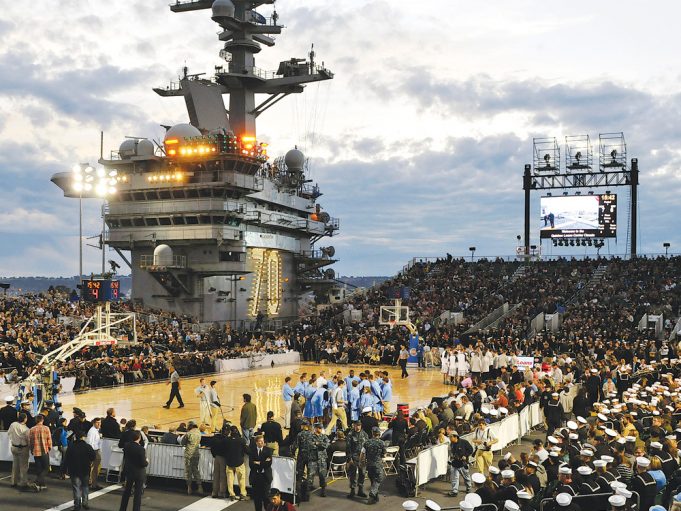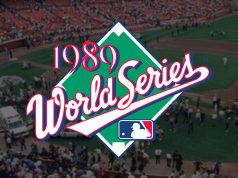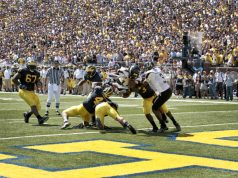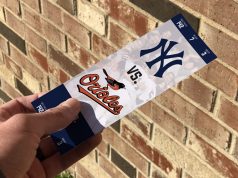Having done hundreds of college basketball games in their officiating careers, a pregame walk-through usually is no big deal for NCAA Division I men’s basketball officials James Breeding, Tony Greene and Mike Reed. They just like to get the lay of the land before a contest begins — check where the scorer’s table is situated, where the clocks are positioned, etc.
But this time, it was different. Really different.
They were about to be part of history, being involved in a contest so unique that the match-up between perennial powers North Carolina and Michigan State was probably the least-talked about aspect of the entire evening.
The three highly regarded officials — all with military backgrounds — had been chosen to do a game in which the court was positioned on the deck of a 1,092-foot-long aircraft carrier, played outside in late afternoon with mostly military personnel among the 7,000 in attendance. Oh, and the President of the United States was going to be there and speak to all those present.
Other than that, it was just a typical college basketball game.
In retrospect, the contest was a footnote to an experience that no one, particularly the three officials, will soon forget. The record book will show the Tar Heels earned a 67-55 victory in the inaugural Carrier Classic, but the game isn’t what will be remembered.
For what took place on 11/11/11 on the USS Carl Vinson off the coast of San Diego was a celebration of American patriotism and spirit, and the three officials were smack dab in the middle of it.
Yes, they played a basketball game on the flight deck of an aircraft carrier, the same ship that had months earlier dumped the body of Osama bin Laden into the sea off its deck. There was a flyover of jets and a lowering of the flag, a daily ritual at military installations, during the first half that gave everyone goose bumps.
“To be surrounded by soldiers and sailors as they lowed the flag and to be standing on that ship that is such an amazing symbol of what America is all about was truly unbelievable,” said Breeding, a former Air Force staff sergeant. “I have to admit, I got the chills.”
Greene agreed.
“The whole experience was surreal,” said Greene, who served in the Air Force for eight years. “I must admit, I thought of my parents (both deceased) when they had the flyover. I thought, ‘Here’s your baby boy.’ It was a good moment, and I felt like a true American.”
The officials got wind of the contest in the spring when John Adams, NCAA national coordinator of men’s basketball officials, sent out an email asking for those people who had military backgrounds to reply. They didn’t know President Barack Obama would be there until later.
“They told us the president is going to come on to the ship and we’d like you to be on the court ready to go when he comes on. So we basically went out onto the court earlier than normal and kind of waited for him,” explained Reed, a retired serviceman who served 23 years as a US Army recruiter for the National Guard. “It was kind of funny because when he came on the floor, immediately he came to us.
“He just kind of said, ‘Hi, guys, how are you doing? Can we stand next to you?’ The president is asking if he can stand next to us,” Reed said. “It’s like, are you serious? You can stand anywhere you want.”
Did the president offer advice to the officials?
“Yeah,” Greene added. “He said, ‘Let ’em play. I don’t want any ticky-tack fouls called.’”
Obviously, security was tight.
“Security was paramount,” Breeding said. “Anything of this nature is going to have a lot of security to begin with, and then you add the president, it becomes more of a target. But I’ve never felt safer in my life. At the same time, we were smart enough to know not to ask a lot of questions.”
The president might have been the headliner, but there was still a game to play. To go along with the occasion, each team wore uniforms with a camouflage design. And instead of their names on their jerseys, the word “U.S.A.” was embroidered on the back.
Tip-off time was at 4:15 p.m. (PST) so the first half was played in natural light before the stadium-positioned lights were needed in the second half.
“Other than playing outside, it was no different,” Breeding said. “In fact, we had more space than we do at a lot of gyms.”
Before the contest, players, coaches and officials expressed concern with the windy conditions, fearing it would play havoc with shooting. But that wasn’t the case. Had the weather been a major problem, however, contingency plans were in place to move the contest to a hangar below.
“If you got outside of the arena they built, the wind was blowing hard on the deck,” Reed explained. “But in the confines of the stadium, it wasn’t.”
The only concern — and it wasn’t really a problem — was the damp court. Occasionally, a player would slip on the surface that became wet because of moisture in the air.
“We had one young man fall down at halfcourt,” Reed said. “I don’t know whether that was because of the wetness on the floor or the sticker they had in the middle of the floor, but that was the only issue that we had during the game. Everything else, everybody just played basketball.”
All three officials said the crowd had a different feel than a normal arena.
“It was like doing a football game,” Greene said. “The noise wasn’t as compressed as it is in some arenas. But the game went very well. During the pregame talk with the captains, I told them that the Navy SEALs would throw them overboard if there were any technical fouls. Their eyes got real big before they realized I was joking.”
“It was a different type of loud,” Reed added. “Usually, when you’re working in an arena, every time you blow your whistle somebody’s got something to say. Not in this game. Usually you feel as a referee sometimes you don’t have a lot of friends. But I felt that every soldier and sailor in that arena was my friend.”
So the three will have stories to tell for a lifetime. And you can bet they won’t get tired of telling them, either.
“I’ve never worked in the Olympics, but this has to be the closest feeling because that night I really felt as if I was refereeing for my country,” Reed said. “It was truly an awesome experience.”
What's Your Call? Leave a Comment:
Note: This article is archival in nature. Rules, interpretations, mechanics, philosophies and other information may or may not be correct for the current year.
This article is the copyright of ©Referee Enterprises, Inc., and may not be republished in whole or in part online, in print or in any capacity without expressed written permission from Referee. The article is made available for educational use by individuals.



















